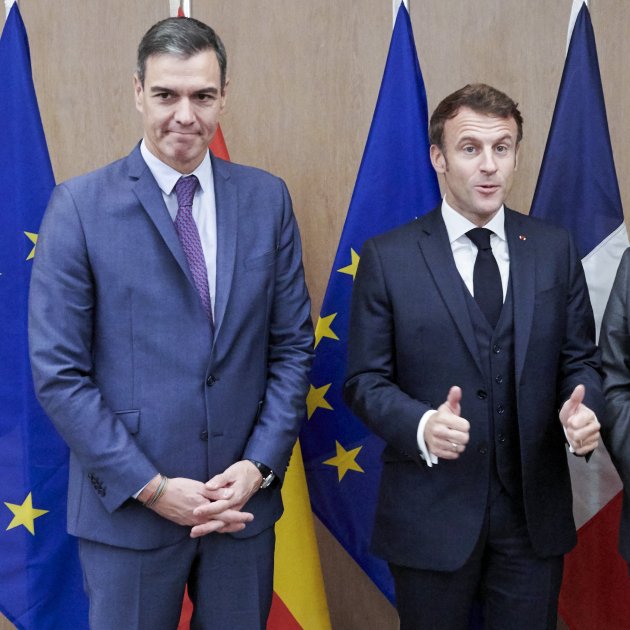The MidCat gas pipeline project has been definitively dropped. The views of French president Emmanuel Macron have ended up prevailing; and after months of rejection from the Élysée of this energy corridor, Macron has convinced the Spanish prime minister, Pedro Sánchez, to back down on the project. There will, however, be a replacement: a submarine "green corridor" dedicated to transporting hydrogen. The agreement was reached in a meeting between the two European leaders in which the Portuguese prime minister, António Costa, also participated.
It was Sánchez himself who announced this agreement between the three leaders. The intention is to develop "a new energy corridor" to interconnect the Iberian Peninsula with the rest of the European Union through an undersea pipeline linking Catalonia with France. Thus, the intention is for green hydrogen to circulate through this conduit, but it will also be used for fossil gas during a transition period. The meeting between Sánchez, Macron and Costa did not last much longer than an hour, and took place at the headquarters of France's Permanent Representation at the European Union. The meeting took place shortly before the start of the European Council in which the twenty-seven will try to overcome differences on new measures to intervene in the energy market and put a ceiling on high gas prices.
Spanish government informs Aragonès
The Spanish minister for Ecological Transition, Teresa Ribera, explained minutes after the news was announced that she had already spoken to the president of Catalonia, Pere Aragonès, to "inform him about the political agreement between Spain, France and Portugal to permit the construction of a green energy corridor between Barcelona and Marseille". According to Ribera, it is a solution that is Europeanist and green, oriented towards the future and to "solidarity".
Scholz-Sánchez alliance
The Spanish prime minister has in recent months stressed its priority of promoting the MidCat, the overland gas pipeline which would have run from Catalonia to the south of France. His advocacy went to the extent of forming an alliance with his German counterpart, Olaf Scholz, at the end of August. Both asserted the need to accelerate the construction of this European gas connection without Macron's approval. In a joint appearance at the Meseberg palace, near Berlin, Scholz noted that Spain had the full support of Germany to advance towards the gas link through the Pyrenees.
Despite the reiterated pressure from Germany and Spain towards France, Macron has never budged from his opposition. The only softening of views suggested from the Élysée was when it was stated, following the Scholz-Sánchez agreement that France would "reconsider" the idea, given that its "friends" were in favour of it. However, just days later, Macron returned to his staunch position of non. Germany went so far as to say that it would back EU financing of a significant part of the project, which initially amounted to around 440 million euros and which France subsequently estimated at around 3,000 million euros.
Macron's main argument for not making the MidCat a reality was that it was an "unnecessary" gas pipeline since the existing pipelines that connect the Iberian Peninsula with France, through the Basque Country and Navarre, are "underutilized". The French president emphasized that during the month of August it was France that was exporting gas to Spain, and not the other way around. "I don't understand the short-term problem they are trying to solve," Macron said.
